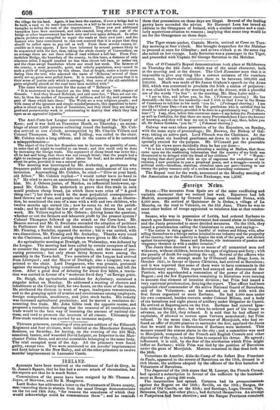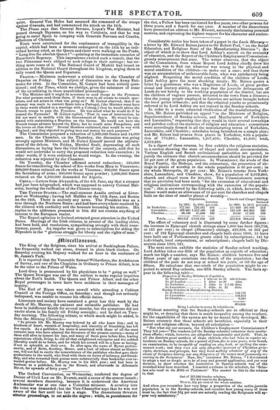gortign Neb35.
SPAIN.—The accounts from Spain are of the same conflicting and variable character that we noticed last week. Espartero had left Madrid, accompanied by General Linage and General Ferraz, with 8,000 men. He arrived at Quintanar de la Orden, a village of La Mancha, on the road to Valencia, on the 23d June. There he was to meet other bodies of troops appointed to reinforce him at that rendez- vous.
Seoane, who was in possession of Lerida, had ordered Zurbano to march upon Barcelona. The movement had caused alarm in Catalonia, and the Junta proceeded to more decided measures. On the 19th, they issued a proclamation calling the Catalonians to arms, and saying- " The nation is rising against a handful of traitors and felons, who, after selling themselves to a foreign nation inimical to our industry and the prosperity
of the country, have the audacity to despise the wish of the people and declare against its sovereignty. Seoane and Zurbano, vile instruments of passion and, vengeance threaten us with a sudden invasion."
The Junta then decreed a levy en masse of all unmarried men and widowers, without children, between the ages of eighteen and forty ; with
the penalty of death for neglecting the call. Several of the officers who participated in the attempt made by O'Donnell and Diego Leon, in. October 1841, in favour of Queen Christina, had arrived at Barcelona; and it was reported that some of them were to have commands in the Revolutionary army. This report had annoyed and discontented the Patriots, who apprehended a restoration of the power of the former Regent ; and the few Esparterists remaining in Barcelona were turning to account that element of intestine division ; but Prim had issued a very equivocal proclamation, denying the report. That officer had been appointed chief commander of the active National Guard of Barcelona,
and of the Volunteers; and he marched on the 20th with the first forces organized to meet Zurbano. He had 6,000 men under
his own command, besides recruits under Colonel Milans, and a body of six battalions and eight pieces of artillery under Brigadier de Castro. He arrived at Esparra„ouera on the 21st. Zurbano had entered Igua- lada without firing a shot ; but when he ordered part of his troops to advance, on the 22d, they refused. It is said that he had offered to capitulate, if allowed to retreat upon Cervera unmolested ; but Prim refused. In the mean time, the Governor of Montjuich, who had re-
fused an offer of 50,000 piastres to surrender the fort, apprized the Junta that he would set fire to Barcelona if Zurbano were molested. This
menace caused the utmost alarm in the city ; and a committee was sent to Montjuich, composed of the French and English Consuls and other dignitaries of the city, to induce him to suspend his threat. He agreed ; influenced, it is said, by the fear of the retribution which Prim might inflict on Zurbano ; while Prim was tied by the position of Barcelona under the guns of 31ontjuich. Matters remained in that dead lock on. the 26th.
Victorian° de Ametler, Aide-de-Camp of the Infant Don Francisco de Paula, appeared in the streets of Barcelona on the 19th, dressed in a rich blouse, the uniform adopted by the officers of the first battalion of Volunteers of Barcelona.
The Imparcial of the 19th states that M. Lesseps, the French Consul, had opened a subscription in favour of the sufferers by the bombard- ment at Reus ; giving 200 reals.
The insurrection had spread. Cornnna had its pronunciamiento against the Regent on the 18th; Seville, on the 19th; Burgos, the capital of Old Castile, on the 25th; and Santiago, Lugo, °cense, Vigo, Betanzos, Cadiz, and other placz--, had declared themselves. An attempt at Pampeluna had been abortive ; and the Basque Provinces remained
quiet. General Van Haien had assumed the command of the troops against Granada, and had commenced the attack on the 16th.
The Presse says that General Serrano, Lopez's War Minister, had passed through Bayonne, on his way to Catalonia, and that he was going to enter Spain in company with Generals Narvaez and Concha, adherents of Christina. Fears were entertained for the continuance of tranquillity in the capital, which had been a moment endangered on the 15th by an indi- vidual having cried, as the Queen and sister were walking on the Prado, "Long live the absolute Queen 1"—pointing at the immediate cessation of Espartero's Regency. This imprudence excited such a tumult, that the two Princesses were obliged to seek refuge in their carriage; but no- thing more came of it. The National Guard of Madrid had issued an address to the National Guard throughout the kingdom, urging them to tally round the Queen and Espartero.
FRANCE.— Ministers underwent a critical time in the Chamber of Deputies on Friday. The subject of discussion was the Army Esti- mates for 1844. In the Committee, M. Guizot had been strictly ques- tioned; and the Times, which we abridge, gives the substance of some of the catechizing in those unpublished proceedngs- tt The Minister said it might be necessary to send troops to the Pyrenees. For what purpose Bend them there, if these were in all events to remain spec- tators, and not actors in what was going on ? M. Guizot observed, that if an attempt was made to convert Spain into a Portugal, (the Minister must have in these words alluded to a marriage with a Coburg,) then he would advise the French troops to pass the Pyrenees. He was asked what he would do if he crossed the Pyrenees? M. Guizot replied, 'That in case of intervention, he did not want to meddle with the Government of Spain. He would be con- tented with maintaining a Bourbon on the throne. He would not have the French troops advance beyond the Ebro; but he would seize Pampeluna, and the towns on that river.' Several Members exclaimed, that would be war with England ; and they objected to giving men and money for such purposes."
The Commission proposed a reduction of 5,300,000 francs and 14,000 men. In the Chamber, on the Thursday, the discussion was going strongly against Ministers, and M. Guizot himself moved the adjourn- ment of the debate. On Friday, Marshal Son% deprecating all such discussions, as laying bare the vital forces of the country, said that he would not undertake to carry the proposed reduction into execution ; in other words, if it were enforced he would resign. In the evening, the reduction was rejected by the Chamber.
On Tuesday, the Chamber affirmed several reductions : 125,000 francs for transferring the school of fire-works from Metz to Vincennes ; 200,000 francs reduced on the works at Vincenes ; 300,000 francs upon the furnishing of arms ; 300,000 francs upon powder ; 1,000,000 francs reduced on the 6,500,000 demanded for Algeria.
CHINA.—Letters from Alexandria, of the 6th June, say that a steamer had just been telegraphed, which was supposed to convey Colonel Mal- colm, bearing the ratification of the Chinese treaty.
THE UNITED STATES.—The mail-steamer Acadia arrived at Liver- pool on Wednesday ; having left Halifax on the 19th Jane, and Boston on the 16th. There is scarcely any news. The President was on a tour through the Northern States ; and had been everywhere received by the citizens with cordiality and the honours becoming his station. His replies to the addresses presented to him did not contain anything of Interest to the European reader.
The Repeal agitation in Ireland attracted great attention in the United States. Meetings of the Irish citizens, in several of the leading cities, had been held, and resolutions, sympathizing strongly with their coun- trymen, passed. An impulse was given to subscriptions for aiding the Repealers in the "glorious struggle for liberty and the rights of man."



























 Previous page
Previous page